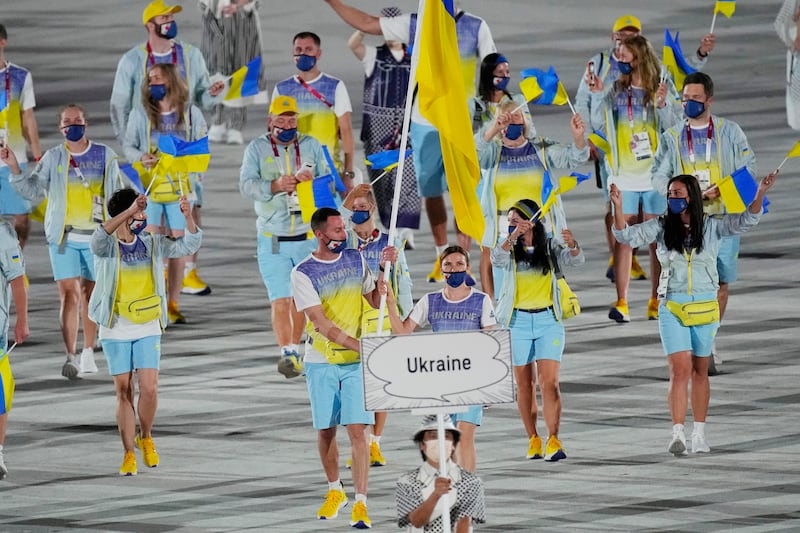Ukraine’s campaign to keep Russian athletes from competing in the 2024 Summer Games in Paris is now targeting International Olympic Committee sponsors in addition to a threatened boycott.
What’s being described as potentially the “biggest rift in the Olympic movement since the Cold War era,” by the CBC in Canada, was ratcheted up again Sunday by Ukraine President Volodymyr Zelenskyy during his daily update on Russia’s war against his country.
“Representatives of a terrorist state should have no place at the Olympics and international tournaments,” Zelenskyy said, promising to continue, “our diplomatic marathon to prevent the Kremlin from using world sports and the Olympic movement for its propaganda.”
He said letters have been sent “to the companies that support the International Olympic Committee the most. These are large international companies that are definitely interested in ensuring that their reputation and support are not used for war propaganda.”
That’s presumably a reference to the highest level of Olympic sponsors, known as The Olympic Partner program or TOP. Currently, 14 companies, including Coca-Cola, Airbnb, Visa and Toyota are estimated to have paid as much as $300 million each over four years.
That money, expected to add up to some $3 billion for the four-year cycle that includes the 2022 Winter Games in Beijing and the 2024 Summer Games in Paris, is a key source of revenue for the IOC, second only to the sale of Olympic broadcast rights.
Organizers of an Olympic Games count on a share of IOC revenues to cover the cost of hosting. How much they receive from the global sponsors, as well as the sale of broadcasting rights, is spelled out in the host city contact.
The IOC reported Salt Lake City received $552 million from the IOC for the 2002 Winter Games out of nearly $3 billion in IOC revenues raised from 2001 to 2004. That included $663 million from TOP sponsors for both 2002 and the 2004 Summer Games in Athens.
Zelenskyy’s efforts to enlist the corporate world’s support in Ukraine’s battle against an IOC proposal to allow Russian and Belarusian athletes back into international competition comes amid talk of boycotting next year’s Olympics.
While no country, including Ukraine, has announced it isn’t sending a team to Paris, Ukrainian sports officials continue to raise the possibility. Ukraine’s national Olympic committee is pushing other nations to consider doing the same.
“We cannot compromise on the admission of Russian and Belarusian athletes,” Ukrainian Sports Minister Vadym Guttsait said, the CBC reported, adding a last option is, in his opinion, that “if we do not succeed, then we will have to boycott the Olympic Games.”
So far, several countries including Poland, Denmark and Estonia, have expressed opposition to the IOC proposal that would require athletes from Russia and its ally, Belarus, to compete neutrally — without flags, anthems or other identification of their countries.
Russia is opposed to the IOC proposal, which also calls for the athletes not to have actively supported Russia’s invasion of Ukraine nearly a year ago. Russian officials have demanded their athletes be treated the same as other competitors.
The United States has also weighed in, with White House press secretary Karine Jean-Pierre telling reporters Friday that if the IOC permits Russians and Belarusians to compete, “it should be absolutely clear that they are not representing the Russian or Belarusian states.”
Late last week, the IOC addressed the boycott threat in an extensive Q&A about what is a reversal of its previous position, that Russian and Belarusian athletes should be barred from international competition.
“It is extremely regretful to escalate this discussion with a threat of a boycott at this premature stage,” the IOC said, adding, “As history has shown, previous boycotts did not achieve their political ends and served only to punish the athletes of the boycotting NOCs (national Olympic committees).”
In 1980, the United States led a boycott by more than 60 countries of the Summer Games in Moscow to protest the Soviet Union’s invasion of Afghanistan. The Soviet Union and its allies then boycotted the 1984 Summer Games in Los Angeles.
Last year, the U.S. was behind a diplomatic boycott of Beijing’s 2022 Winter Games, sending athletes but not government officials. The protest of China’s human rights record came at the urging of Utah Sen. Mitt Romney, head of Salt Lake City’s 2002 Winter Games.
A congressional committee also grilled American companies about their sponsorship of an Olympics in China. IOC leaders complained to the Utah bid team that hopes to host the 2030 or 2034 Winter Games that the U.S. didn’t show enough support for Beijing.


